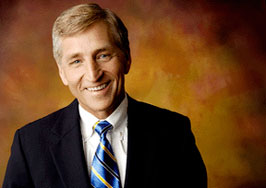
On January 31 in 1606 Guy Fawkes was executed in London.
In 1801 John Marshall became Chief Justice of the U.S. Supreme Court. In 1865 the US abolished slavery.
In 1917 Germany announced its policy of unrestricted U-boat attacks. In 1929 Leon Trotsky was exiled from the Soviet Union. In 1930 Scotch Tape came out.
In 1943 the 5-month Battle of Stalingrad came to an end. In 1968 the Tet Offensive began in Vietnam.
And in 1992 a phone call in Montana would change the course of the state’s future.
In Helena that Friday morning it was 28 degrees. Frost clung to the trees and the breath misted from early-morning joggers. Inside the home of Montana’s Attorney General, the phone rang. It was 7:15.
Marc Racicot picked it up. Montana Lieutenant Governor Denny Rehberg was on the other end.

Rehberg had grown up in Billings, graduated from Billings West High School, went to MSU for a time, then transferred over and got a public administration degree from Washington State University in 1977.
He got noticed in politics in 1977 while serving as an intern in the Montana State Senate. That led to a position on Representative Ron Marlenee’s Washington, D.C. staff from 1979 to 1982.
He then headed back to Montana to work as a farmer until he ran for the Montana House of Representatives in 1984. Rehberg would serve three terms, leaving in 1991.
While in his off-time from the legislature, Rehberg became the Marlenee campaign manager in the 1986 election. He did so well in that capacity that he was chosen as Conrad Burns’ campaign manager in 1988, where he helped bring about the upset win over John Melcher that year.
At that point Rehberg served as the state director for Senator Burns until he was appointed Governor Stan Stephens’ lieutenant governor in the summer of 1991.
Rehberg was calling Attorney General Racicot that morning to let him know that Governor Stan Stephens “would be announcing publicly two hours later he was dropping out of the governor’s race for health reasons.”
Rehberg had “learned of the decision the night before” and, even though Stephens “intended to publicly urge Rehberg to run for governor with his full endorsement,” the lieutenant governor told Racicot “he wasn’t sure running for governor was necessarily the best thing for him to do.”
Rehberg asked Racicot what he wanted to do. Probably a bit perplexed at the question – and the whole early-morning situation – Racicot “said he had no idea, having just learned of Stephens’ decision” on the phone right then and there. “Rehberg urged Racicot to keep his options open.”
The phone call ended, both men went to work. Whether they discussed the issue with coworkers or friends that day isn’t known. What is known is that over the next 5 days the two men discussed the issue further.
Then 6 days after that early-morning phone call the two men were declaring their intent to run for the state’s top office, with Racicot on top of the ticket and Rehberg set to retain his current position of lieutenant governor.
So why was Rehberg calling Racicot so early that Friday morning? Why didn’t he take that top spot for himself, as Governor Stephens wanted?
Rehberg and Racicot had known each other since the 1985 Legislature and bumped into each other again on the 1988 campaign trail. In 1989 Rehberg had “spent an hour urging Racicot to consider challenging” Max Baucus for the U.S. Senate, to no avail.
Racicot was seen as a shoe-in for reelection as attorney general at that point. No challengers had come forth to run against him in the 1992 race.
So to answer the question as to why Rehberg went with Racicot and not himself, one can only assume it was timidity coupled with a view that Racicot’s star was shining brighter and rising faster than his own.
Jack Rehberg was Denny’s father and an ex-legislator. He was “shocked” that his son had passed up Stephens’ endorsement that he run for governor.
Rehberg cited his crisis management studies in college with his decision to wait and ask around before accepting Stephens’ nod. He began to assess his own strengths and weaknesses and “what he thought was best for Montana.”
Rehberg’s own experience was mainly legislative, political and administrative at that point, most gained from his campaign work for Marlenee and Burns, plus his seven months as lieutenant governor.
Speaking to reporters later about his decision to have Racicot on the top of the ticket and not himself, Rehberg said that:
“Racicot, the popular attorney general who had built a reputation prosecuting major criminal cases, brought a strong legal background, good family values, high credibility, public confidence and a demonstrated ability to draw independent and Democratic voters.”
Rehberg felt his strongest area was building coalitions with different groups, not leading those groups.
For Marc Racicot, the 1992 governor’s race had started.


